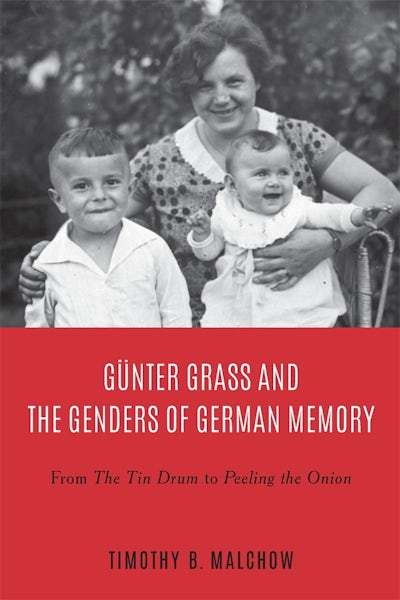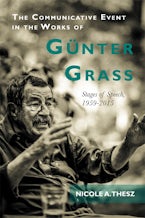
Title Details
258 Pages
22.8 x 15.2 cm
Series: Culture and Power in German-Speaking Europe, 1918-1989
Series Vol. Number:
1
Imprint: Camden House
Günter Grass and the Genders of German Memory
From The Tin Drum to Peeling the Onion
- Description
- Contents
- Author
- Reviews
The first book to examine the connection between gender and memory in Grass's oeuvre, which is especially timely in light of current concerns about male privilege.
Günter Grass (1927-2015) was a fixture at the heart of German cultural life, a self-styled spokesman of the Kulturnation (cultural nation) who imagined it linking him to canonical male literary figures and their authority. He was also the object of valid feminist criticism: a rigid conception of gender permeates his works, belying his professed skepticism toward ideologies. A heterosexual male, Grass lent his representative persona a natural veneer by appropriating his era's gendered discursive constructs, including Heimat, the Bildungsroman, and narratives about German wartime victims and perpetrators. Such appropriation elevated his remembering artist's masculinity above that of the status quo's defenders and exploiters of memory.
This book is the first to evaluate the connection between gender and memory in Grass's oeuvre and its legacy in light of current concerns about male privilege. It highlights his breakthrough novel The Tin Drum (1959) and his memoir Peeling the Onion (2006). The former establishes the gendered persona that Grass would develop in subsequent decades to relate contemporary issues to Nazi-era memories. The latter reclaims the novel's autobiographical material but fails to account for his decades-long silence about having served in the Nazi Waffen-SS. Instead, it foregrounds his mourning for his mother, allowing for a more personal reading of his oeuvre and its gendered imagery.
Günter Grass (1927-2015) was a fixture at the heart of German cultural life, a self-styled spokesman of the Kulturnation (cultural nation) who imagined it linking him to canonical male literary figures and their authority. He was also the object of valid feminist criticism: a rigid conception of gender permeates his works, belying his professed skepticism toward ideologies. A heterosexual male, Grass lent his representative persona a natural veneer by appropriating his era's gendered discursive constructs, including Heimat, the Bildungsroman, and narratives about German wartime victims and perpetrators. Such appropriation elevated his remembering artist's masculinity above that of the status quo's defenders and exploiters of memory.
This book is the first to evaluate the connection between gender and memory in Grass's oeuvre and its legacy in light of current concerns about male privilege. It highlights his breakthrough novel The Tin Drum (1959) and his memoir Peeling the Onion (2006). The former establishes the gendered persona that Grass would develop in subsequent decades to relate contemporary issues to Nazi-era memories. The latter reclaims the novel's autobiographical material but fails to account for his decades-long silence about having served in the Nazi Waffen-SS. Instead, it foregrounds his mourning for his mother, allowing for a more personal reading of his oeuvre and its gendered imagery.
Acknowledgments
Abbreviations, Translations, and Transcriptions
Introduction
Grass's Biography in Context: 1927-1959
Corporeal Memory, Trauma, and Art in The Tin Drum
Bildung, Heimat, and Gendered Modes of German Memory in The Tin Drum
A Patriarchal Arbiter of German Cultural Memory and His Feminized Others: Leveling Bildung, Opening Heimat, and Championing Art from the 1960s to the New Millennium
Grass's Early Life Once Again: Broken Silence, Mourning, and Gendered Approaches to Memory in Peeling the Onion
Epilogue
Works Cited
Abbreviations, Translations, and Transcriptions
Introduction
Grass's Biography in Context: 1927-1959
Corporeal Memory, Trauma, and Art in The Tin Drum
Bildung, Heimat, and Gendered Modes of German Memory in The Tin Drum
A Patriarchal Arbiter of German Cultural Memory and His Feminized Others: Leveling Bildung, Opening Heimat, and Championing Art from the 1960s to the New Millennium
Grass's Early Life Once Again: Broken Silence, Mourning, and Gendered Approaches to Memory in Peeling the Onion
Epilogue
Works Cited
"Timothy Malchow's study is a noteworthy, timely and needed contribution to the existing scholarship on Grass as it approaches his oeuvre through the lens of memory and gender, two concepts that are - so Malchow's core argument - inextricably linked in Grass's works." MONATSHEFTE
"Malchow's book is original, even ground-breaking, in showing how Grass draws on two fundamentally German modes of discourse, the Bildungsroman and the Heimat motif (often enacted in another prose genre, the Heimatroman) to shape his narratives and guide his exploration of German memory, particularly as it relates to the question of guilt and innocence, victimhood and perpetration, with respect to the period of National Socialist rule. . . . [The book] constitutes a noteworthy contribution to Grass scholarship . . . . Excellent . . . ." John Pizer, GERMAN STUDIES REVIEW
"Including admirably researched considerations of literary genres, education, homeland (Heimat), memory, trauma, and sexuality, this is a multifaceted and satisfying portrait of the literary artist as a man." J. M. Jeep, CHOICE
"Throughout his book, Malchow makes a strong case for the connection between gender-coded imagery and the process of memory and memory creation in the two works. . . . By establishing the link between gender and memory, Malchow opens an additional avenue for Grass scholars to explore in assessing the author's work." Adrian Chubb, GERMAN QUARTERLY
Hardcover
9781640140851
March 2021
£97.00 / $115.00
Ebook (EPUB)
9781800100329
March 2021
£24.99 / $29.95
Ebook (EPDF)
9781800100404
March 2021
£24.99 / $29.95
Title Details
258 Pages
2.28 x 1.52 cm
Series: Culture and Power in German-Speaking Europe, 1918-1989
Series Vol. Number:
1
Imprint: Camden House






